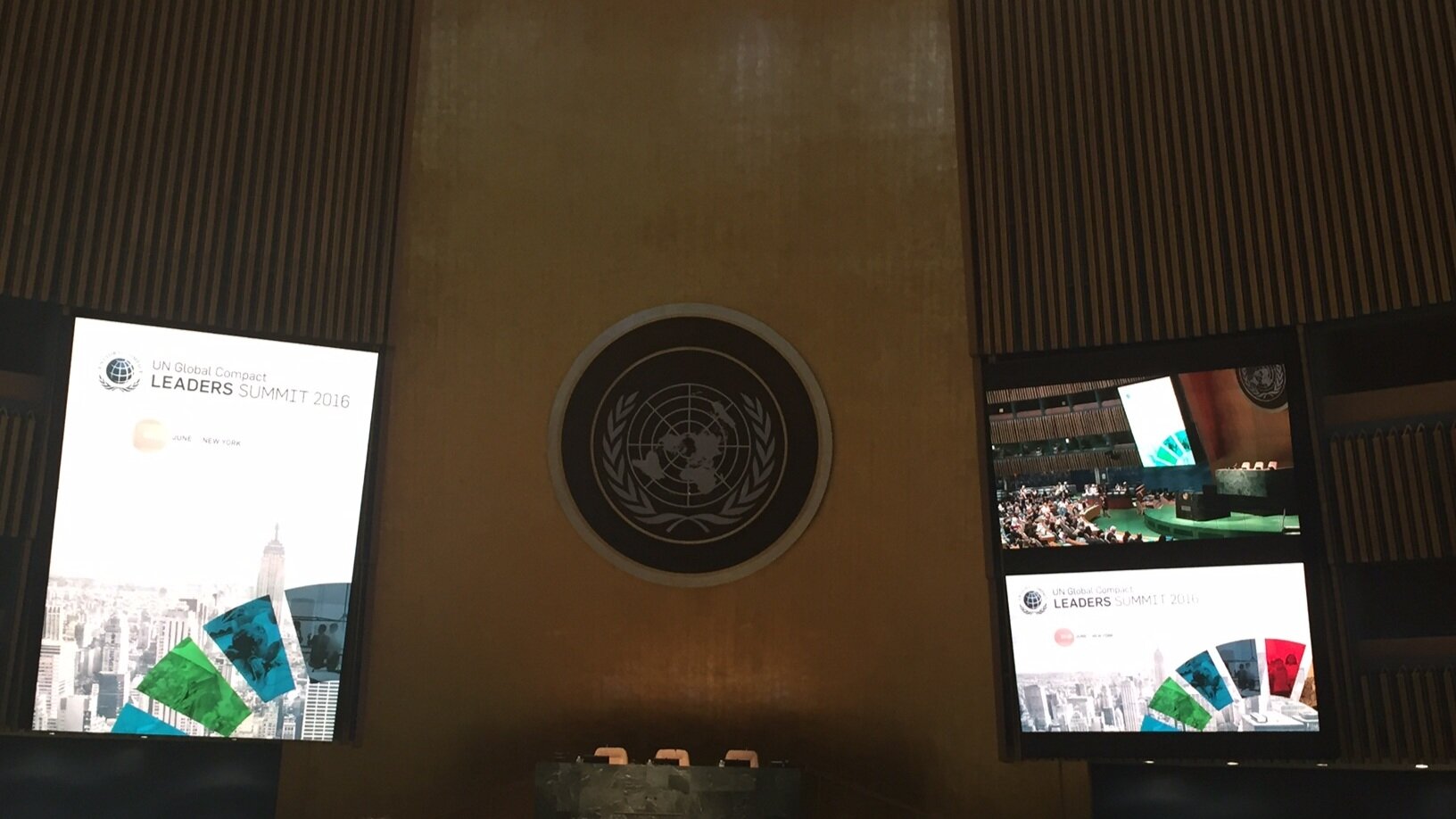“The increase in gender diversity contributes to increased focus on environmental, social, and governance (ESG) considerations, including reduced greenhouse emissions, and it may help unlock more than US$12 trillion in new market value linked to the Global Goals”

Enhancing openness and inclusion throughout corporate policies and operations requires techniques, tools and practices that bring results
We deliver gender balance best practices proposing tools, enablers, innovative solutions and initiatives to attract and retain female talent creating a pool of best practices, generating awareness and adhesion at all business and operations levels, applying successful strategies for change through the integration of change management and gender mainstreaming, and assessment of the most successful elements, proposing to look at how organisations are embracing gender mainstreaming, and go much further by looking at gender as part of an organisational change management strategy.
Promote Comprehensive Business Case
Promote the comprehensive business case including financial and non-financial performance
Support ambitious corporate target setting through facilitated performance analysis and capacity building;
Promote the comprehensive business case for women’s full participation and leadership in business, including financial and non-financial performance;
Support companies in creating more gender-inclusive businesses aligned with the Women’s Empowerment Principles;
Connect business to UN partners and other experts that can further support business action to advance SDG5;
Foster policy and stakeholder dialogue at the country level to address barriers to women’s representation and leadership in business;
Showcase and promote women’s business leadership driving corporate sustainability and progress on the Global Goals.
Connect your business with UN partners and Experts
Connect business to UN partners and other experts
Establish company-wide goals and targets for gender equality and women’s empowerment and measure progress through clear performance indicators.
Make managers at all levels accountable for results against these goals and targets through their performance reviews.
Engage and consult internal and external stakeholders in the development of company policies, programmes and implementation plans.Ensure that existing policies are gender-sensitive – identifying factors that impact women and men differently – and that corporate culture advances equality and inclusion.
Review the requirements for board membership, and other governance bodies and committees, to ensure gender equality.
Foster policy and dialogue at the country level
Foster policy and dialogue at the country level
Confidently set ambitious and realistic corporate targets for gender equality demonstrating commitment and action to your employees, investors and other stakeholders
Understand your current gender equality performance through the facilitated use of the Women’s Empowerment Principles Gender Gap Analysis Tool
Engage in accelerated learning opportunities specific to your country context
Build a network of peers, UN partners and experts to support your gender equality strategy and work collectively to tackle persistent barriers to gender equality.
Showcase women in your company who are driving business success, sustainability and contributions to the SDGs.
Engage in accelerated learning opportunities specific to your country context
► Confidently set ambitious and realistic corporate targets for gender equality demonstrating commitment and action to your employees, investors and other stakeholders
► Understand your current gender equality performance through the facilitated use of the Women’s Empowerment Principles Gender Gap Analysis Tool
► Build a network of peers, UN partners and experts to support your gender equality strategy and work collectively to tackle persistent barriers to gender equality.

“MCI MULTILATERAL PARTNERS is a global stakeholder addressing global challenges by working with clients to ensure that women and men can equally participate in creating business value and secure influence and income for themselves. When men and women alike are allowed to make decisions and pursue employment, entrepreneurship, and leadership, societies can reach their economic potential.”
Build a network of peers, UN partners and experts to support your gender equality strategy and work collectively to tackle persistent barriers to gender equality.










Engage and consult internal and external stakeholders in the development of company policies, programmes and implementation plans.
Fortune 1000 companies do not have in place gender equality programmes and those that do, barely qualify as Stage One.
Stage 01 Public Relations Purpose
Companies in Stage One are generally in a reactionary mode and do not have comprehensive strategies for developing, implementing and tracking gender equality at all business and operations levels. While there is a desire to promote gender equality and develop some sort of plan for that purpose, the companies have not made a commitment to dedicate the resources needed to ensure its success. Many companies in Stage One participate in and support advocacy group activities for public relations purposes, but they are not working towards producing tangible process deliverables.
Stage 02 Centralised Strategy
Companies in Stage Two generally have a comprehensive plan for gender equality and have appointed a key manager who is accountable for its implementation. The companies have installed tracking and management systems, are conducting recurring spend analyses, and identifying business opportunities and comprehensive sourcing activities. They are also looking for opportunities to elevate diverse firms to preferred business status. However, at this stage of maturity, gender equality is still largely a centralised corporate strategy. It has not yet become an integral part of the company.
Stage 03 Global Culture & Practice
The few companies that have reached this stage have developed, implemented and managed a comprehensive plan and execution strategy, monitored and evaluated progress towards goals, and made adjustments where necessary, all as part of their day-to-day activities and requirements. At this stage, gender equality has become an integral part of the corporate culture and practice.
“Gender equality is not only a social and moral imperative but also an economic necessity. Across the world, countries are losing $172 trillion in wealth because of differences in lifetime earnings between women and men”
Do your actions satisfy the leadership qualities for gender equality?
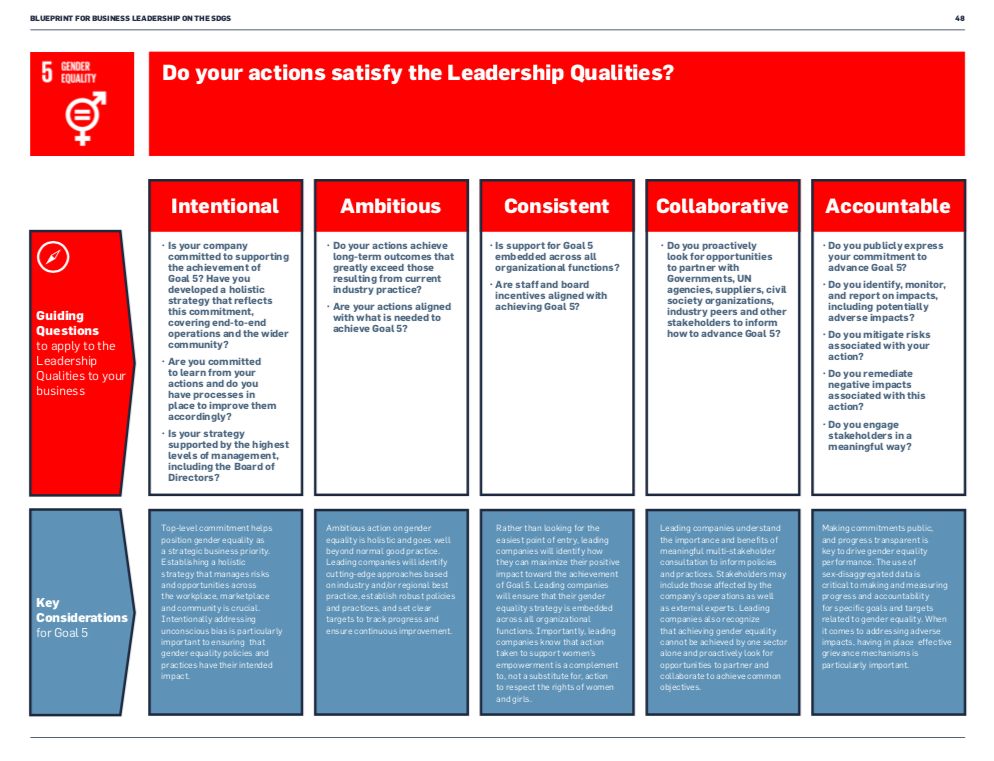
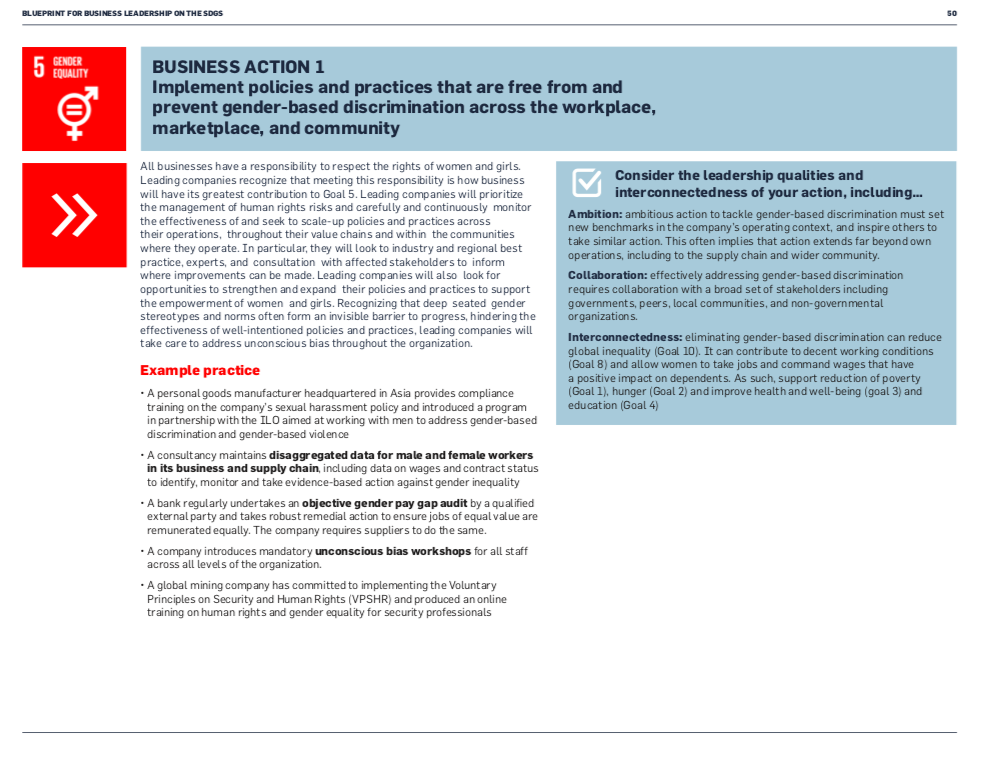
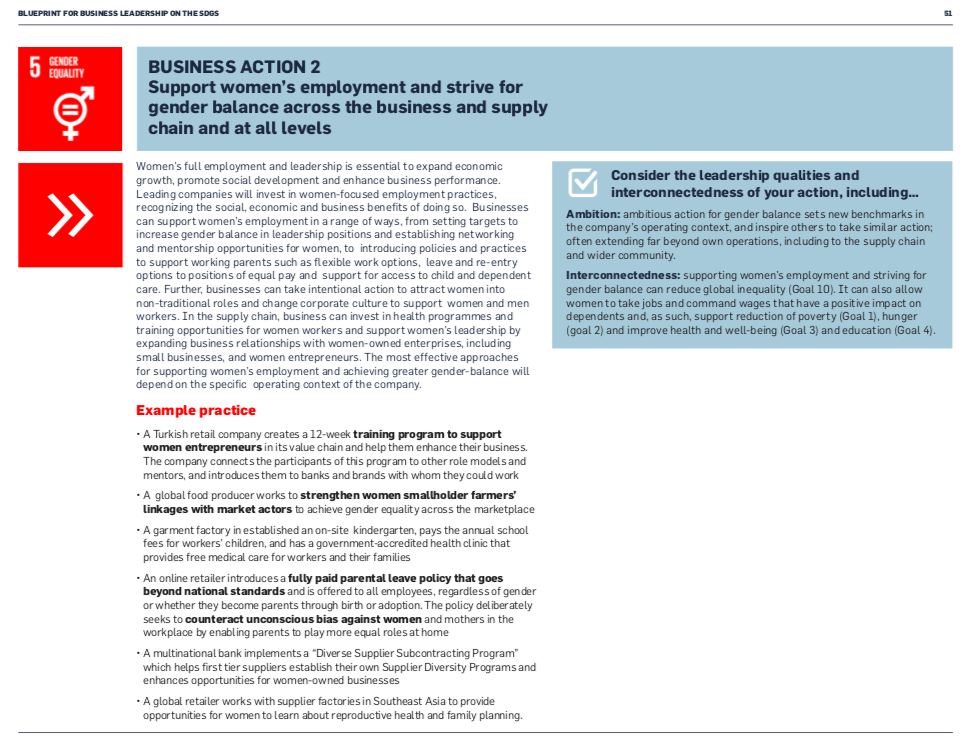
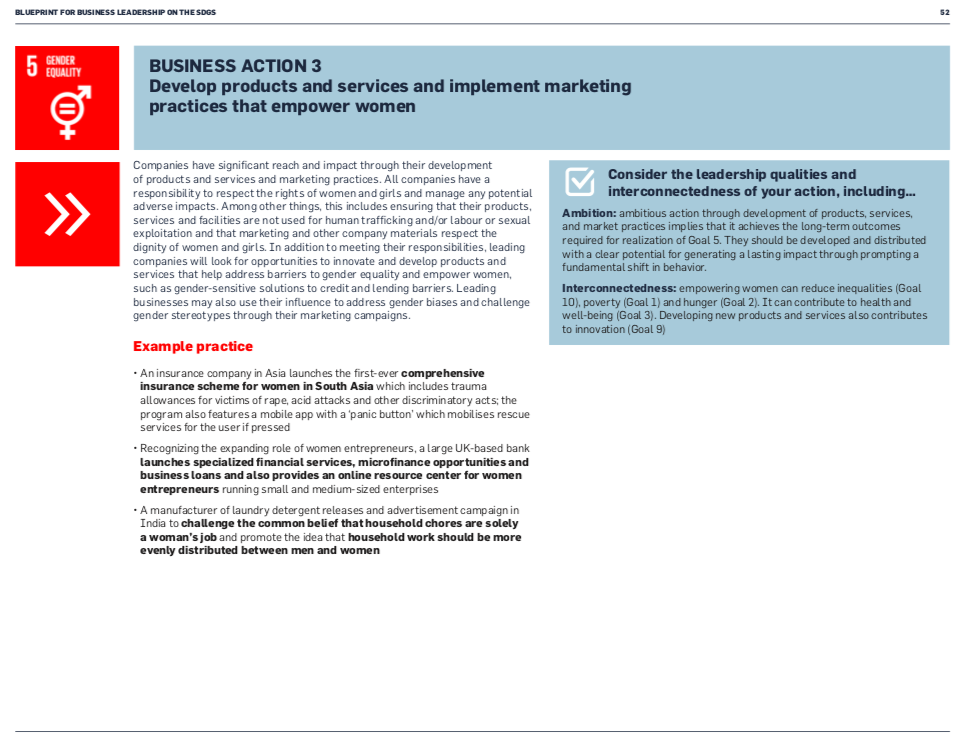
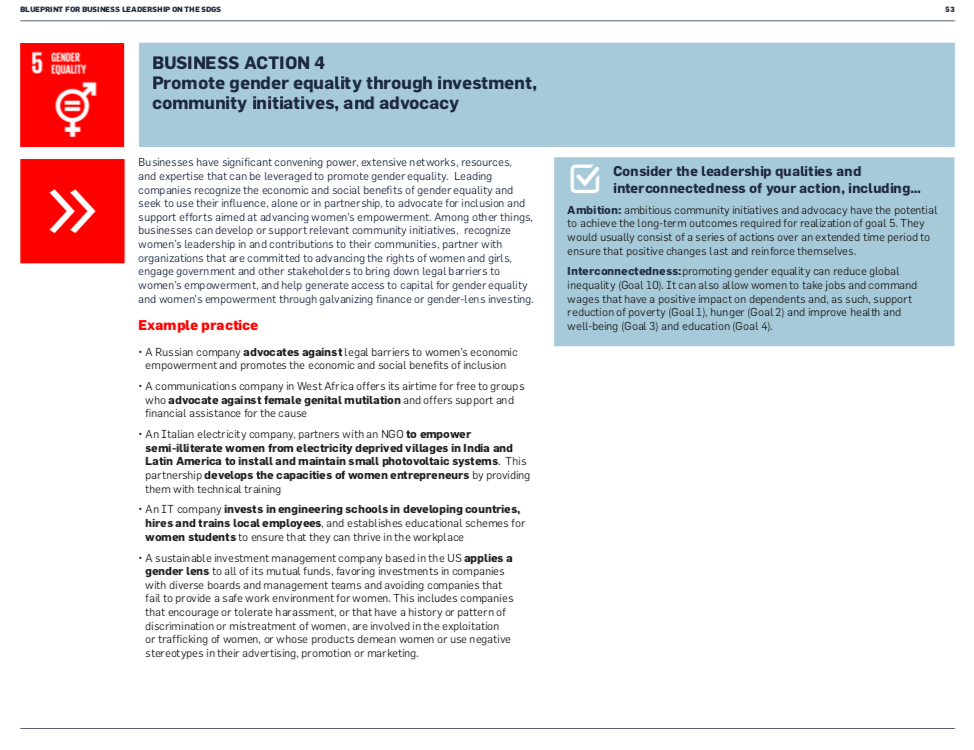

Our deep expertise in the public and private sector is complemented with 10 years of experience across all industries and functions. We support our clients with programs from start to finish, using our proven delivery methods, tools, and solutions for diagnostics, analysis, strategy development, capability building, and implementation.
Gender Equality is Imperative to Building a Sustainable Economy for the Future
Taking bold action to increase female representation and leadership in business is needed more than ever. The global pandemic COVID-19 is forcing companies to accelerate their shared value efforts, and with the global momentum for transformation, businesses have an opportunity, and an obligation, to engage on the urgent needs of our planet. Our ability to bounce back from this crisis is dependent on how we include everyone equally. If more women take part in shaping a new social and economic order, chances are that it will be more responsive to everyone’s needs and make us all more resilient to future shocks.
Partner with us to develop your gender equality strategy with our most streamlined approach
We provide a set of considerations to help the private sector focus on key elements integral to promoting gender equality in the workplace, marketplace and community. Guided by The Women’s Empowerment Principles, forged through an international multi-stakeholder consultative process, we provide a “gender lens” through which business can survey and analyse current practices, benchmarks and reporting practices. We offer three tiers of consulting engagements to fit your needs. At the end of any engagement, you will have a strategic framework with specific action items to achieve your targeted goals.
— OUR purpose
“We are setting the first step towards achieving a sustainable strategy for change, proposed and developed from within - from the organisation’s individuals, teams and the organisation as a whole - to finally have an impact on all of society.”

Operative Countries
“MCI Multilateral Partners is bringing the craft of gender economic governance from global development risks to the financial markets and establishing gender economic governance as a macro-critical investment discipline.”



